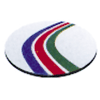
Dutch-Bangla Bank Limited
Head Office
Motijheel C/A. Dhaka
Bangladesh
Known As
SWIFT Code
Stock Code
Category
Type
Origin
Description
Dutch-Bangla Bank Limited (DBBL) is a scheduled join venture private commercial bank in Bangladesh. The bank is established jointly by local Bangladeshi parties spearheaded by M Sahabuddin Ahmed (Founder & Chairman) and the Dutch company FMO. DBBL was established under the Bank Companies Act 1991 and incorporated as a public limited company under the Companies Act 1994 in Bangladesh with the primary objective to carry on all kinds of banking business in Bangladesh. In June 1996, DBBL started its formal operation in banking sector. Since then DBBL gained its huge popularity because of its social welfare activities and affordable banking service.
Stock Exchange
DBBL is listed with both the stock exchanges in Bangladesh, the Dhaka Stock Exchange Limited (DSE) and the Chittagong Stock Exchange Limited (CSE).
Dutch-Bangla Bank Limited is commonly referred as DBBL, Dutch-Bangla, Dutch Bangla and Dutch Bangla Bank among its employees and consumers.
DBBL is most widely recognized for its donations to social causes and its IT investment (largest ATM network). However it has recently stated that it will stop expansion on its ATM network as the current numbers have exceeded demand and hence diminishing returns (if any). Although it is widely believed it is a loss-making/subsidized unit which DBBL rationalizes as quasi CSR.
After instability and frequent management changes in its initial years, DBBL overcame these obstacles to establish rapid growth since the year 2000. The bank grew its reputation through social work rather than profits. The bank's conservative nature, long-term strategies, hefty social donations and technology investments have always led to modest but steady profits. DBBL has been known to be overly conservative in its banking practices. Much of the success and strategy has been attributed to the leadership of the founder chairman, M Sahabuddin Ahmed.
Despite being the largest corporate donor in Bangladesh, investor confidence was unhindered. In March 2008, DBBL share prices reached Tk. 14325.80 in the Dhaka Stock Exchange, setting the record for the highest stock price in the history of Bangladesh. It is also one of the few banks that does not participate in merchant/investment banking (which can lead to sporadic growth).
ATM Networks
With more than 1000 of ATM booths all over the country, DBBL's has the largest ATM networks in Bangladesh. DBBL offering free access to its ATM network for its subscriber. This network helped DBBL gaining more popularity and confidence among subscriber and expanding banking opportunity to mass people. This entire network is being maintained by its own IT staff without any 3rd party dependency.
With this vast number of ATMs installed, Dutch-Bangla Bank initiated a co-branded ATM initiative in Bangladesh where the bank would provide ATMs and networking free of charge to any bank's branches. Mutual Trust Bank was the first bank to take the advantage and the first co-branded ATM in Bangladesh started operation on 28 May 2008.
Fast Track
In 2010, Dutch Bangla Bank Limited (DBBL) introduced "Fast Track" in the country which is the first of its kind in the country that is like a mini branch. Along with the generic ATM withdrawal service, it lets the customer deposit small amounts of money to DBBL account with a limit of 20,000 BDT. Moreover, the Fast Track also provides some account opening service and loan information. By 2010, DBBL has installed 50 Fast Tracks in Dhaka, Chittagong and Sylhet cities.
Internet Payment Gateway
Dutch-Bangla Bank Limited (DBBL) introduced Internet Payment Gateway to facilitates E-commerce in Bangladesh. Any Visa/MasterCard card holder (local or overseas) can user their card to pay DBBL authorized e-Merchants against their purchase of goods and service. They can also pay DESCO electricity bills. DBBL is working with airlines, railways, Utility companies, educational institutions and Stock Exchanges for facilitating purchase of ticket, payment of bills/fees and IPO subscription through the Internet Payment Gateway. It is also working to make an interface with the renowned PayPal payment gateway. Once everything in operation, this will change the payment mechanism in Bangladesh and will reduce public suffering. It will also boost the E-commerce and open the door for freelancer and ICT company to earn more remittance for the country.
Mobile Banking
Dutch-Bangla Bank Limited (DBBL) is the first bank in Bangladesh, who introduced mobile banking service to bring poor people from remote area under smart banking service. Bangladesh Bank has already allowed 10 banks to initiate mobile banking with the aim to connect the deprived section of the society with the modern banking system, DBBL is the first runner among of them.
DBBL is operating this new innovative banking service through Banglalink and Citycell mobile operator and their approved agents through out the country. One can create a bank account visiting any of the approved agents showing proper documents with a fee of Tk 10. Subscriber must own a mobile phone to get the service. Once the account is created, a 4 digit mobile banking PIN code will be provided to perform all sort of banking activities securely and secretly. Subscriber can withdraw and deposit cash amount from his mobile going to the agents and agents will guide and help the customers if there is any difficulty. Since, mobile network is extremely insecure and data are sent unencrypted, a customer can deposit or withdraw money five times a day and he can deposit or draw Tk 5,000 per day. One percent of the transaction amount or Tk 5, whichever is higher, will be taken as cash-in-charges. In case of cash out the charge will be 2 percent of the transaction amount or Tk 10. However, the registration fee, salary and remittance disbursement services will be provided free of cost.
Source: Wikipedia



